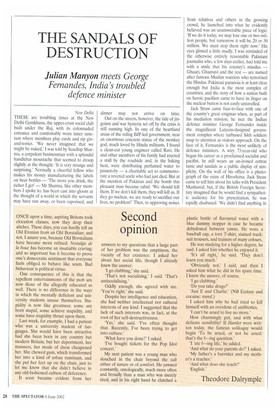THE SANDALS OF DESTRUCTION
Julian Manyon meets George
Fernandes, India's troubled defence minister
New Delhi THESE are troubling times at the New Delhi Gymkhana, the upper-crust social club built under the Raj, with its colonnaded entrance and comfortably worn inner sanctum where members play cards and sip ginand-tonics. 'We never imagined that we might be nuked,' I was told by Sandhip Sharma, a corpulent businessman with a splendid handlebar moustache that seemed to droop slightly at the thought. 'It is very strange and surprising.' Normally a cheerful fellow who makes his money manufacturing the labels on beer bottles — 'The more you drink, the richer I get' — Mr Sharma, like other members I spoke to, has been cast into gloom at the thought of a world in which the servants may have run away, or been vaporised, and dinner may not arrive on time.
Out on the streets, however, the tide of jingoism and war hysteria set off by the crisis is still running high. In one of the heartland areas of the ruling BJP-led government, near an enormous concrete statue of the monkey god, much loved by Hindu militants, I found a clean-cut young engineer called Ravi. He and other members of his family had erected a stall by the roadside and, in the baking heat, were distributing perfumed water to passers-by — a charitable act to commemorate a revered uncle who had just died. But at the mention of Pakistan and the bomb this pleasant man became rabid: 'We should kill them. If we don't kill them, they will kill us. If they go nuclear, we are ready to sacrifice our lives, no problem!' Then, to approving noises from relatives and others in the growing crowd, he launched into what he evidently believed was an unanswerable piece of logic: 'If we do it today, we may lose one or two million people, but tomorrow it will be 20 or 30 million. We must stop them right now.' His eyes glinted a little madly. I was reminded of the otherwise entirely reasonable Pakistani journalist who, a few days earlier, had told me with a smile that his country's missiles — Ghauri, Ghaznavi and the rest — are named after famous Muslim warriors who terrorised the Hindus. Pakistani paranoia is at least clear enough but India is the most complex of countries, and the story of how a nation built on heroic pacifism came to have its finger on the nuclear button is not easily unravelled.
Jack Straw came face-to-face with one of the country's great enigmas when, as part of his mediation mission, he met the Indian defence minister George Fernandes inside the magnificent Lutyens-designed government complex where turbaned Sikh soldiers snap to attention as visitors approach. On the face of it, Fernandes is the most unlikely of defence ministers. A wiry 73-year-old who began his career as a proclaimed socialist and pacifist, he still wears an un-ironed cotton tunic and sandals as a public display of simplicity. On the wall of his office is a photograph of the ruins of Hiroshima, Jack Straw came to tell him about his talks with President Musharraf, but, if the British Foreign Secretary imagined that he would find a sympathetic audience for his presentation, he was rapidly disabused. 'We didn't find anything in it,' Fernandes told me curtly a few minutes after Straw had left, and then confided with a slight smile that, as soon as our interview was over, he would see his Prime Minister, Atal Bihari Vajpayee, and advise him not to give an inch in his own meeting with the British Foreign Secretary later that evening.
Indeed, no sooner had I asked my last question than Fernandes climbed into his highly polished government-issue Ambassador car. a faithful replica of a 1950s Morris, and rattled off to the Prime Minister's residence. I was left wondering if nuclear war could really be conducted from its juddering back seat.
India's strategy owes much to the nature of the nationalistic BJP-led government in which George Fernandes is a key coalition partner. Certainly, India suffered the gravest of provocations in last December's terrorist attack on the parliament in New Delhi, but there are some who suggest that the government has sought to extend and exploit the crisis for domestic purposes, and now finds itself in uncharted diplomatic and political territory with panicky foreign residents leaving in droves on the advice of their governments. Before these latest developments, the stand-off with Pakistan certainly seemed to distract public attention from two deeply damaging episodes: the Hindu rampage in Gujarat — allegedly backed by local BJP officials — in which hundreds of Muslims died; and, before that, the Tehellca corruption scandal, which briefly cost George Fernandes his job.
Tehelka.com is an Indian Internet news magazine which sent its reporters, masquerading as arms dealers, to meetings with defence officials and politicians, and found that a surprising number of them were willing to accept bundles of rupees and the promised services of call-girls to further the fictitious arms purchases that the reporters were offering to arrange. Embarrassingly for George Fernandes, one of these meetings took place in his own ministerial residence, where his long-time 'companion', Ms Jaya Jaitly, who is also a controlling influence in his small political party, Samata, was videotaped accepting 200,000 rupees (about 13,000) as a 'contribution to party funds'. Fernandes reacted furiously, suggesting that the Pakistani intelligence service could be behind the Tehelka tapes and calling them 'an anti-national bunch of lies'. He resigned, but returned to office six months later because, according to the government, his presence as defence minister was essential to 'national security'.
Meanwhile, the editor of Tehellca.com, Tarun Tejpal, has experienced a bitter time since publishing his revelations. Investors in his company have apparently suffered official raids and investigations, income has fallen to the point where he can no longer pay his staff, and he has had to accept police protection following threats against his life. When I met him, he arrived guarded by seven policemen carrying sidearms and sub-machine guns. Mr Tejpal is no lover of Pakistan — like many Indians he describes it as 'a crazy rogue state' — but perhaps not surprisingly he is a little cynical about the government's motives in the confrontation. 'In a situation where they were continuously under fire they needed an issue,' he says. 'This one can be made red-hot when domestic concerns demand it.' What many are now wondering, however, is where the line is between red-hot and out-of-control.
For its part, India's defence establishment remains outwardly unperturbed. The men who committed their careers to the extraordinary challenges of building India's bomb and concealing the final stages of its development from American spy satellites remain convinced that their nuclear deterrent is the key to India's security. K. Subrahmanyam (Indians of the old school prefer initials) was until quite recently director of the Institute for Defence Studies and Analysis and is regarded as one of the main strategic thinkers behind India's nuclear policy. According to him, that policy is an inevitable response to long-standing Pakistani threats, and is better thoughtout than those of some other nuclear powers. 'You see,' he told me, 'we don't have tactical nuclear weapons. . . Our doctrine is simply based on a punitive response to nuclear attack, and the punishment would be severe.'
This elderly Indian, who spent years focusing his sharp mind on the unthinkable in a musty office at the Ministry of Defence, has harsh words for the stream of Western intermediaries which has already included Chris Patten and Jack Straw and will soon reach a sort of climax with Donald Rumsfeld. aumsfeld will lecture us, but we don't need to be told again about the effects of nuclear war,' Subrahmanyam told me severely. 'What we need from this old Cold War warrior is to hear what he is doing to stop Pakistani sabre-rattling.' In these circles. the Pakistani President's apparent rejection of the nuclear option in one television interview counts for little. Not a word he utters is trusted in New Delhi. `Musharraf says one thing on Mondays, Wednesdays and Fridays, and another thing the rest of the week,' Subrahmanyam told me.
Meanwhile, an unreal sense of calm persists, broken only by the private warnings of Western diplomats, one of whom told a startled group of expat businessmen that if they knew what he knew, they would not be sitting there. Whatever its motives, the Indian government's strategy of tension appears to have led to a dangerous impasse. But men such as George Fernandes seem in no hurry to break it by going to war. As I left his office, he reminded me of his pacifist roots with a sincerity that it seemed churlish to disbelieve. It would indeed be strange if a man in a cotton smock and sandals, to some extent an inheritor of Gandhi, helped to unleash humanity's first full-scale nuclear war.
Julian Manyon is Asia correspondent of ITN News. This article is also reproduced for ITV News online and can be seen in 'Location Reports' at wwwitv.comlnews.























































































 Previous page
Previous page